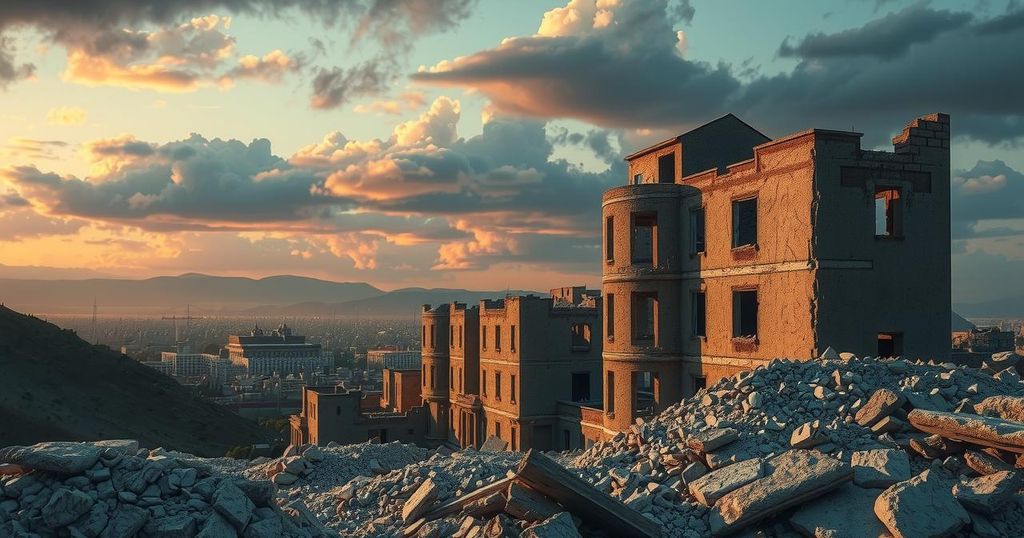Escalating Tensions: M23 Rebels Take Control of Goma in the DRC

Rebels from the March 23 Movement (M23) have captured Goma, causing over 773 deaths and escalating conflict in the DRC. This situation intensifies tensions with Rwanda, as the M23 seeks control over mineral-rich territories. The humanitarian crisis worsens, with millions displaced and facing food insecurity. International intervention may be crucial to reach a sustainable resolution.
In a significant deepening of the conflict in eastern Democratic Republic of the Congo (DRC), the March 23 Movement (M23) has captured Goma, the capital of North Kivu province. Since gaining control on January 27, the M23’s advance has resulted in the deaths of at least 773 individuals and the occupation of other key towns such as Sake and Minova. Reports suggest that the M23 is now progressing towards Bukavu, indicating the potential for further territorial loss for the DRC government.
The M23, founded in April 2012, roots its conflict in historical ethnic tensions linked to the 1994 Rwandan genocide. This conflict is further complicated by the presence of the Democratic Forces for the Liberation of Rwanda (FDLR), a Hutu rebel group accused of committing severe atrocities in North Kivu. The M23 claims to defend Congolese Tutsis, adding a layer of ethnic strife to an already volatile situation.
The capture of Goma is pivotal, as it places a key mineral-rich region in rebel hands, heightening the potential for resource exploitation. North Kivu, home to active volcanic regions, is rich in minerals such as coltan, crucial for electronics. With the M23 already in control of Rubaya, a major mining town contributing to global coltan production, the group has significantly benefited from mineral trade, labeling their operations as profit-driven.
Additionally, the takeover of Goma intensifies tensions between the DRC and Rwanda, raising fears of renewed interstate conflict. DRC officials have accused Rwanda of directly supporting the M23. A United Nations report has indicated Rwanda’s involvement, claiming that Rwandan troops are actively engaged alongside M23 forces. This has led to accusations that Rwanda seeks to monopolize North Kivu’s valuable resources through its support of the M23.
The situation exacerbates a dire humanitarian crisis; as of March 2024, the DRC sees approximately 7.2 million internally displaced persons, one of the largest crises globally, with millions facing severe food insecurity. The scale of displacement and suffering demands urgent international attention and intervention.
Historically, the DRC has experienced two major wars with Rwanda, ignited by similar territorial disputes. The previous wars resulted in significant loss of life and instability. However, there are hopes for diplomatic resolutions, as previous conflicts have been mitigated by international mediation efforts. Yet, given the current circumstances, reaching a peaceful solution remains precarious.
The DRC government’s reluctance to engage in peace talks until regaining lost territory complicates diplomatic efforts. International powers, particularly from the West, have been urged to leverage their influence. For instance, France has offered support to the DRC government, while the UK has threatened to withdraw aid from Rwanda.
Belgium is spearheading calls for the EU to reconsider a minerals trade deal with Rwanda that compromises ethical mining standards in exchange for development assistance. Advocates argue that a ceasefire between the DRC and M23 alone will not suffice; comprehensive strategies addressing the conflict’s root causes are imperative for sustainable peace.
The Democratic Republic of the Congo has a long history of conflict driven by ethnic tensions, deeply rooted in events surrounding the Rwandan genocide in 1994. Following the genocide, many Hutu militants fled into the DRC, sparking a continuation of violence in eastern regions, particularly in North Kivu. The March 23 Movement (M23) emerged from this fraught backdrop, claiming to defend Congolese Tutsis against discrimination and violence. Over the years, control over the region’s rich mineral resources has fueled further conflict, exacerbating humanitarian crises and international tensions, particularly with neighboring Rwanda.
The situation in eastern DRC showcases a complex interplay of ethnic strife, humanitarian crises, and geopolitical maneuvering. The recent seizure of Goma by the M23 presents significant challenges for the DRC government and raises concerns of escalating conflict with Rwanda. While there are hopes for diplomatic resolutions, recent history suggests that lasting peace will depend on addressing the underlying causes of the conflict, particularly regarding resource control and ethnic tensions.
Original Source: theconversation.com








